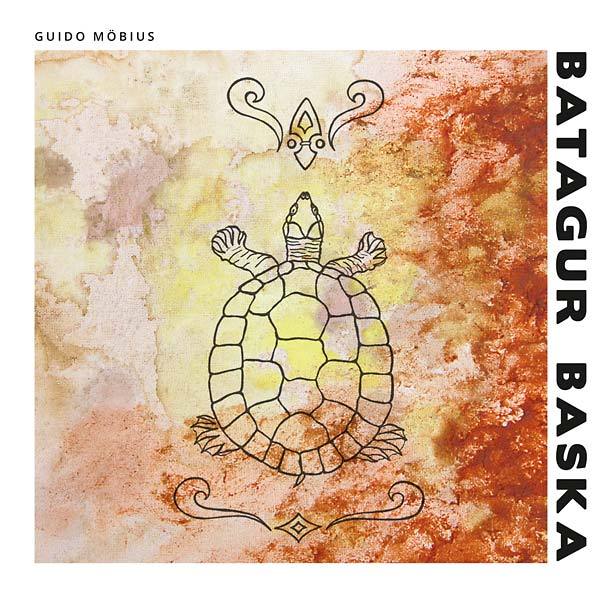A staple of the Berlin electronic scene, producer, DJ, artist and serial collaborator to boot, Guido Möbius can seem a restless figure. His music is also often at odds with a lot of the cool, "urban" avant-classical electronica that has been the staple in the last decade or so of German alternative pop. His fourth solo release sees a continuation of the waspish, contrary image he has steadily built up. I’m a big fan, but still, it’s always difficult to feel entirely at peace with his relentlessly probing music. His sound often reflects uncomfortable moral or spiritual interzones, where the listener is confronted with ambiguous passages suggestive of something sinister. And this latest – named after a species of Terrapin – is yet another strange record, boasting many a Wyrd cut.
Batagur Baska seems to be composed from a palette of drier, harsher electronic compositions than previous releases like Spirituals and Gebirge. It sounds dusty, sandy, the sounds generating a considerable amount of chaff and scree. At times the "feel" is as dry as Klaus Schultze’s epic synth washes on Lord Krishna Von Golowka, though Batagur Baska is by no means imbued with the same kind of romantic bravura. The opener and title track plods slowly into view; the menacing shift and shakedown of synths and rattling percussive elements making the listener immediately think that this particular piece of music is an off-cut from Joy Division’s Closer, one banished to some long-locked cabinet and now freed, and trying to find a way to commune with its long lost brethren. It "plods about" a bit more, just about avoiding outstaying its welcome.
Like many of Möbius’s records, Batagur Baska demands that we listen to things in microscopic detail; certain sounds are overloaded with a meaning we can’t really understand, and small scale sonic investigations are magnified to a worrying degree. Take the hypnotic ‘-Ing’. There’s a great creaking door sound here that gets worked to the bone, and you wonder if he has some sort of affliction that necessitates him banging and hitting anything in his way, just to find out what sound it makes. His is an inquisitory vibe, forever sniffing out possibilities like a gun dog on a scent. I suppose that is also seen by the quality of guest musicians here, and what they play. Take, for example, the role given to brilliant electronic composer Andrea Belfi, who adds a hi hat on ‘Nach Draussen’. You’d have thought Möbius would have asked Belfi to add his signature Gothic-electronic miasma to the track, but no, it’s a surprising decision and maybe indicative of how Möbius wants to surprise himself, and us.
His interest in building up simple vocal loops and drones (that often act as some accusatory Greek chorus asking us to judge matters) is still as strong as ever. This trait was investigated to an almost hysterical degree on ‘Spirituals’ but in this regard the new record is a more laid back affair. Things don’t jump out and grab you. Tracks like ‘-Ing’ and ‘Windsurfing Chile’ are more meditative and nod to the abstract, vaguely intellectual-incidental electronic sounds that emanated from Studio G. Backwards, or funny voices abound, it’s all a bit "1970s". ‘Windsurfing Chile’ boasts voice-parts which resemble the witterings that Damo Suzuki indulged in on the beginning of ‘Soup’, or some piece of extempore wordplay by Mick Quantius.
It is fair to say that Möbius’ ‘Muse’ is as sinister as it is playful; appearing as der Narr in your dreams, as a painted doll bought at a fair, or a stray Tarot card found in a skip. Take ‘Rowno Malin Ternopol’, which is a free percussive thing closer to Lean Left having a piss about than honest-to-goodness C21st Deutsche electro. The track broadens out to include a nervous beat and yet another guest, Eric Mandell, who adds some head-wobbling vibraphone. This element alone immediately sets the piece in Rodion territory – or an impression of Rodion making some bastardised Goan house. Other tracks like ‘Moloch’ and ‘Call The Police Now’ share a similar bug eyed vibe. They are insect-like in spirit, a quality that reminds me of Möbius’ countryman, Toulouse Low Trax. The juddering beat on ‘Moloch’ initially sounds like an old teleprinter fed too many sweets, developing into an incurable electronic itch by the track’s end. For its part ‘Call The Police Now’ recalls older Möbius tracks off ‘Spirituals’ with its disturbing vocals. Somehow the music just about hangs onto itself. It’s a very odd track to end a record.
In fact, after a few listens you do begin to wonder how this disparate collection of tracks share the same space. Imagine shaking a box of stones, that is the edgy, disconnected feeling you get with this record. But then that is a trademark sound of Möbius, a restless artist always examining the potential of sounds and whittling out what is possible, and discarding what is superfluous. It’s all over in 35 minutes. Somehow it feels like an hour lived out in the blink of an eye.


